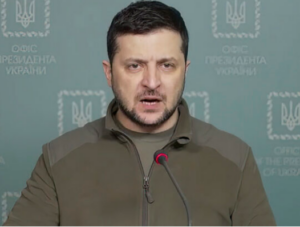The Rising Tension: Zelensky’s Strategic Gamble and the Global Implications
As the world watches closely, the actions of Ukrainian President Volodymyr Zelensky have raised significant questions about the current geopolitics between Russia, Ukraine, and their respective allies. Recently, Zelensky made headlines when he claimed that the arrival of North Korean troops in Russia signifies the onset of World War III—a claim that leaves many analysts puzzled about its accuracy and implications.
A Counteroffensive Unlike Any Other
In August 2024, Ukraine took a bold step by invading the Kursk region of Russia, a maneuver some analysts interpreted as yet another cross-border raid aimed at sending a message to Moscow. However, it quickly became clear that the Ukrainian Armed Forces had no intention of retreating and were seeking to establish a foothold in Russian territory. This controversial move raises essential questions: What motivated Ukraine to cross this line? Were the orders coming directly from a seemingly inexperienced Zelensky, or were they influenced by American neoconservatives, particularly those within the Biden administration?
The ambiguity surrounding this operation makes it challenging to ascertain the real motivations behind Zelensky’s decisions. When pressed for clarity, he offered a rather convoluted rationale: “It is now our primary task in defensive operations overall to destroy as much Russian war potential as possible,” he stated. This approach suggests that the focus is shifting not only to territorial defense but also to offensive maneuvers deep within Russia—a risky gambit that could have unforeseen repercussions.
The Dichotomy of Support
While Zelensky has indicated that his focus includes “creating a buffer zone on the aggressor’s territory,” he also hinted at a broader strategy of seeking diplomatic support from various global partners, including those in Europe and the Global South. This dual approach positions Ukraine as not merely a victim but as an active player attempting to reshape the balance of power against Russia.
“I’ve already expanded and will continue to expand the circle of those who support a just end to this war,” he added, emphasizing his reliance on Western allies. Yet, this reliance has not come without consequences. Observers note that any military action on Ukrainian soil could prompt a more aggressive response from Russia, as seen with North Korea’s support for Moscow.
The Delicate Balance of War
The ramifications of Ukraine’s invasion stretch well beyond its borders. Russian Foreign Minister Sergei Lavrov has declared that we have entered “a qualitatively new phase” of what he refers to as a “Western war against Russia.” Such pronouncements contribute to the narrative that this conflict has evolved from a localized territorial dispute into a larger confrontation involving various global powers.
In this intricate chess game, the stakes are increasingly high. Critics of Zelensky’s administration argue that the invasion may be a misguided attempt to assert Ukraine’s position while ignoring the potential for escalating violence and instability. Some analysts worry that this could provoke a stronger military response from Russia and its allies, further complicating an already tense situation.
What Lies Ahead?
As we look forward, the question remains: was Zelensky’s decision to invade Russian territory a bold strategy or a desperate gamble? The outcomes will likely influence not only Ukraine’s future but also the geopolitical landscape at large. The extreme risk involved could either fortify Ukraine’s negotiating position or plunge it deeper into conflict.
Ultimately, while the war in Ukraine has drawn extensive media coverage, the nuanced complexities of its geopolitical implications warrant a deeper exploration. Here at Extreme Investor Network, we believe it’s essential to consider the interconnectedness of global economies and how these military tensions might ripple through markets, investment strategies, and international relations. As events continue to unfold, staying informed and prepared to adapt is more crucial than ever.
Stay tuned to our platform for ongoing coverage and analysis of the evolving situation. We strive to offer insights that help you navigate through the layered world of international economics and politics.

